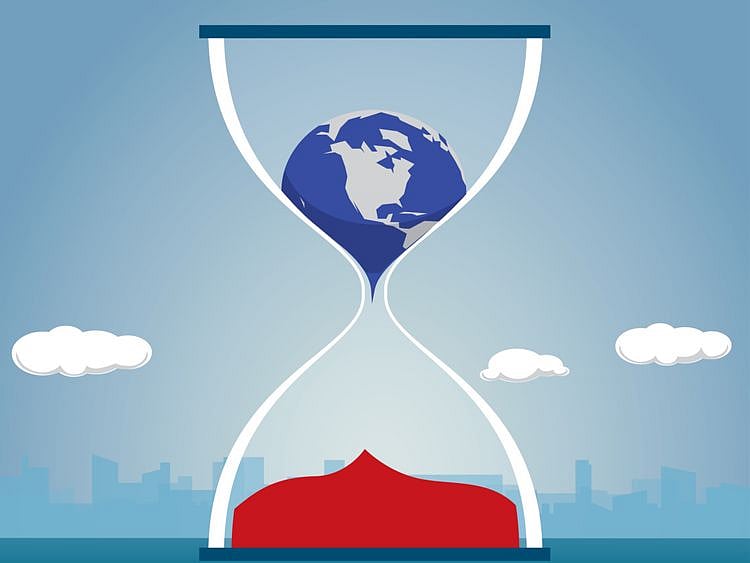Trump cannot fight millions trying to save planet
Despite US president's cynicism and indifference, climate movement is gaining momentum

Recently the selection of 16-year-old climate activist Greta Thunberg as Time magazine’s “Person of the Year” seemed to trigger many on the political right, led by President Donald Trump, who called the choice “ridiculous” and mocked Thunberg for supposedly having an “Anger Management problem.” The episode was a disgraceful yet fitting end to a year that saw bold new ideas to fight climate change meet with inaction, ignorance and worse.
This month, world leaders held global climate talks in Madrid, where they hoped to resolve lingering issues related to the Paris agreement and build momentum toward more aggressive measures. Instead, the talks ended in frustration and finger-pointing, with Trump and the United States receiving much of the blame.
“We’re in a very politically difficult time right now where we’ve got one key world leader denying climate change,” said a representative from the island nation of Tuvalu. “So it’s very hard to get other countries to move forward when you’ve got such a critical country playing a spoiling role.”
Trump’s denial of climate change in the face of a rapidly escalating crisis, as I have argued before, is perhaps his greatest dereliction of duty. He formally initiated US withdrawal from the Paris agreement in November — a reprehensible move by the world’s second-largest carbon emitter that gives other countries, such as China, an excuse to shirk their obligations.
In the past year, his administration has also gutted the Obama administration’s Clean Power Plan and moved to permit more drilling and fracking on federal lands.
In total, the administration and Congress have taken more than 130 actions since the president took office “to scale back or wholly eliminate federal climate mitigation and adaptation measures,” according to the Climate Deregulation Tracker at Columbia University’s Sabin Centre for Climate Change Law.
Abdicating responsibilities
Yet as the federal government abdicates its responsibilities, states across the country are stepping in to fill the leadership void. After California passed a landmark bill in 2018 requiring the state to transition to 100 per cent clean power for its electrical needs, many states adopted similar laws in the past year. Twenty-four US states have also banded together to form the US. Climate Alliance, committing to meet the carbon emissions targets established in the Paris agreement.
Meanwhile, with the support of grass-roots activists, some lawmakers are beginning to expand the scope of the climate debate. In October, for example, the Colorado legislature approved a measure sponsored by state Rep. Emily Sirota, a Democrat, that will require an official assessment of many bills’ impact on carbon emissions. As lawmakers grow more attuned to the importance of keeping the climate crisis at the Centre of the debate, this idea, which mirrors the traditional budget-scoring process, could serve as a model for other states and even Congress in the future.
Paris agreement goals
And it’s not just states that are taking action. A new report from the America’s Pledge initiative, led by former California governor Jerry Brown and former New York mayor Mike Bloomberg, finds that states, cities and businesses committed to fulfilling the goals of the Paris agreement account for more than half of US emissions and more than two-thirds of the economy.
Together, this growing coalition is helping ensure that progress continues until the election of a president, hopefully in 2020, who takes the threat of climate change seriously.
The report concludes that “full achievement of already-on-the-books policies from state and local actors — paired with rapidly shifting economics in the power sector — would reduce emissions by 19 per cent below 2005 levels by 2025 and 25 per cent below 2005 levels by 2030.”
Of course, these steps should not obscure the need for global and US leaders to embrace bold measures to address the crisis, including a Green New Deal and the decarbonisation of the economy. It will take coordinated action on a global scale to stave off a global catastrophe. But the climate movement is gaining momentum.
It now includes cities and states, businesses and activists around the world. And it is proving that while the Trump administration might be able to slow progress, it cannot suppress the will of millions of people who are fighting to save the planet. As Thunberg said at a recent UN climate conference, “We do not have to wait. We can start the change right now.”
—Washington Post
Katrina vanden Heuvel is an American editor, publisher and columnist.
Network Links
GN StoreDownload our app
© Al Nisr Publishing LLC 2026. All rights reserved.